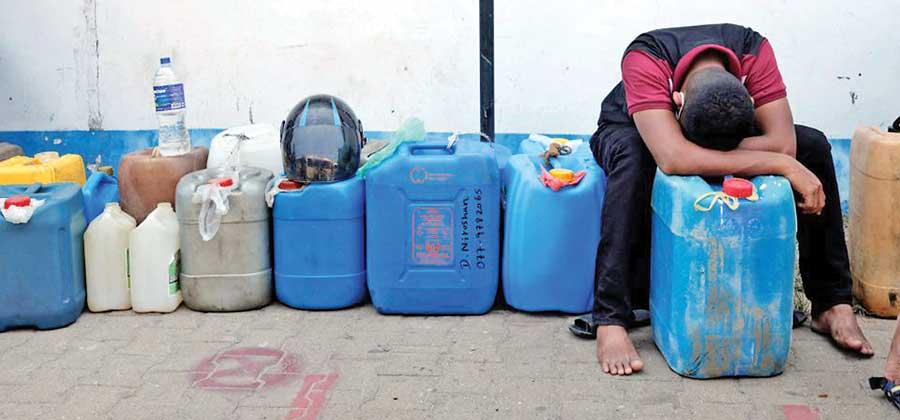27 Apr 2022 - {{hitsCtrl.values.hits}}

A man rests while waiting in a line to buy diesel near a Ceylon Petroleum Corporation fuel station, amid the country’s economic crisis in Colombo (Reuters)
- Since mid-2020, a lot of economists have asked the Government to go to the IMF because we are unable to make these payments
- As the shortages of essentials increase and protests continue, conversations on possible outcomes of the current economic situation and expected IMF support are happening online and elsewhere
- The situation where we don’t go to the IMF and delay it isn’t new to Sri Lanka
Last week, the four-member Sri Lankan delegation led by Finance Minister Ali Sabry and Governor of the Central Bank Dr Nandalal Weerasinghe left for talks with the International Monetary Fund (IMF) in Washington.
Central Bank Dr Nandalal Weerasinghe left for talks with the International Monetary Fund (IMF) in Washington.
The discussions are still ongoing. Following initial discussions, the IMF said that discussions with Sri Lanka on a potential IMF loan programme were at an early stage and any deal would require “adequate assurances” that Sri Lanka’s debts could be put on a sustainable path.
As the shortages of essentials increase and protests continue, conversations on possible outcomes of the current economic situation and expected IMF support are happening online and elsewhere.
The Advocata Institute had a discussion recently highlighting the underlying issue which is the economic crisis that has been present all along and what’s in store for Sri Lanka with the IMF.
Debt restructuring isn’t new to Sri Lanka as it has happened some 600 odd times in the last 70 odd years. There are many examples of countries that have recovered from it - Rehana
What are the initial steps that should be taken at the moment?
One of the most critical things the economy is facing now in terms of the actual problem is things stemming from the forex shortage that’s causing worsening power cuts and food shortages, explained Chayu Damsinghe, Product Head, Macroeconomic and Thematic Research at Frontier Research.
“So dealing with that or at least reducing the impact of that is the critical thing. For that, the signalling step would be raising the interest rates pretty significantly,” he said.
“Then moving forward properly with the IMF negotiation, and accelerating steps on the debt negotiation restructuring process.
“We should also I think, increase as a result of us taking these steps to improve the forex emergency on the ground and then we can also move on to more short to medium term action such as budgetary reform and the like,” he added.
Rehana Thowfeek, Economic and Research Associate at Advocata Institute added that it has come to a situation where the economy has to be stabilised first since it’s spiralling out of control. She agrees that the country needs to increase policy rates because it is going to help the country curb inflationary and devaluation pressures.
Thowfeek said she believed there was a sequence of policy decisions that had to be made and thinks it is very confidence-inspiring that now the country has a Central Bank Governor who leans more towards orthodox economics.
According to her, it puts the country in a better position than before and appointing a good Governor was also one of the better decisions that were made. “The policy rates and then ramping up the IMF negotiations, coming out and telling the public that this is what we have told the IMF and this is when the discussions are going to start, all these are important and about building confidence,” added Rehana.
Do not spread the myth that that free education and free health are going to go away because of the IMF - Umesh
If these problems aren’t solved soon, we won’t have electricity for days
Umesh Moramudali, economist and lecturer at the University of Colombo said that it was important to emphasise that the country needs to think about and go for debt negotiations immediately.
“Our usable reserves are below 500 million dollars which is low and that’s why we can’t use all of these reserves,” said Umesh. He explained that Sri Lanka imports a lot of stuff every month and now we don’t have enough money to import. That’s why the fuel shipments and the gas shipments are sitting near the dock without having the ability to unload.
“If we do not pay the debt, it could get worse and we might not have electricity, fuel etc. for days.”
Chayu Damsinghe added saying, “Compared to a lot of other things, the idea of default has no clear definition of exactly what constitutes what. We talk about selective default, partial default, disorderly, orderly. None of these are in clearly defined terms.
Different circumstances in different countries can lead to any of these overall situations. The less confidence that you can provide, the less clarity you can provide. Then the more disorderly and worse the outcomes can get.”
Rehana pitched in saying there was a fear that there were no solutions. She went on to explain that some people don’t understand what is debt and what is defaulting and the implications of it.
But there are solutions. It’s just a matter of actually taking the steps, implementing those solutions and taking the effort to do what has to be done.
“Debt restructuring isn’t new to Sri Lanka as it has happened some 600 odd times in the last 70 odd years. There are many examples of countries that have recovered from it. Solutions are there, we have best practices, and we have international case studies. There are lots of experts both local and international. Therefore it’s important to maintain the confidence that we can get out of this,” said Rehana.
The less confidence that you can provide, the less clarity you can provide. Then the more disorderly and worse the outcomes can get - Damsinghe
“Free education and health will not go away”
Speaking of the myths and misinformation going on about IMF support, Umesh said, “The IMF does not ask for fiscal consolidation which means the IMF asked the government to reduce the expenditure but not to reduce the expenditure on education, health or even social welfare. What they’d ask is to immediately restructure the subsidies as to what we are going to do with the full price of electricity. “
“The IMF doesn’t advocate cutting social spending. They do ask for spending cuts and these largely have to come from reducing infrastructure, and military spending and the emphasis is more on the revenue side. They ask the government to work on how to increase our revenue rather than cutting expenditure on education or health,” stated Umesh.
Why haven’t we gone to the IMF before when it was the feasible solution?
Since mid-2020, a lot of economists have asked the Government to go to the IMF because we are unable to make these payments. Rehana stated that she thought that it is probably a political decision not to go with the IMF.
“There were a lot of proposed homegrown solutions and import substitution. We will get non-debt inflows, and the Port City would bring us new investors,” said Rehana.
She believes that there was a lot of overconfidence in these other policies that the Government and the officials have come up with. If we had gone at the right time, we wouldn’t even be in this situation, to begin with, she explained.
The situation where we don’t go to the IMF and delay it isn’t new to Sri Lanka, said Damsinghe. “A lot of other countries have done the same. It’s common enough that there’s a term for it called “gambling for redemption” where you essentially hope as a government. It brings hope because it has happened for so many countries like Thailand and Indonesia and many of them have recovered quite well”.
25 Nov 2024 8 hours ago
25 Nov 2024 9 hours ago
25 Nov 2024 9 hours ago
25 Nov 2024 25 Nov 2024
25 Nov 2024 25 Nov 2024